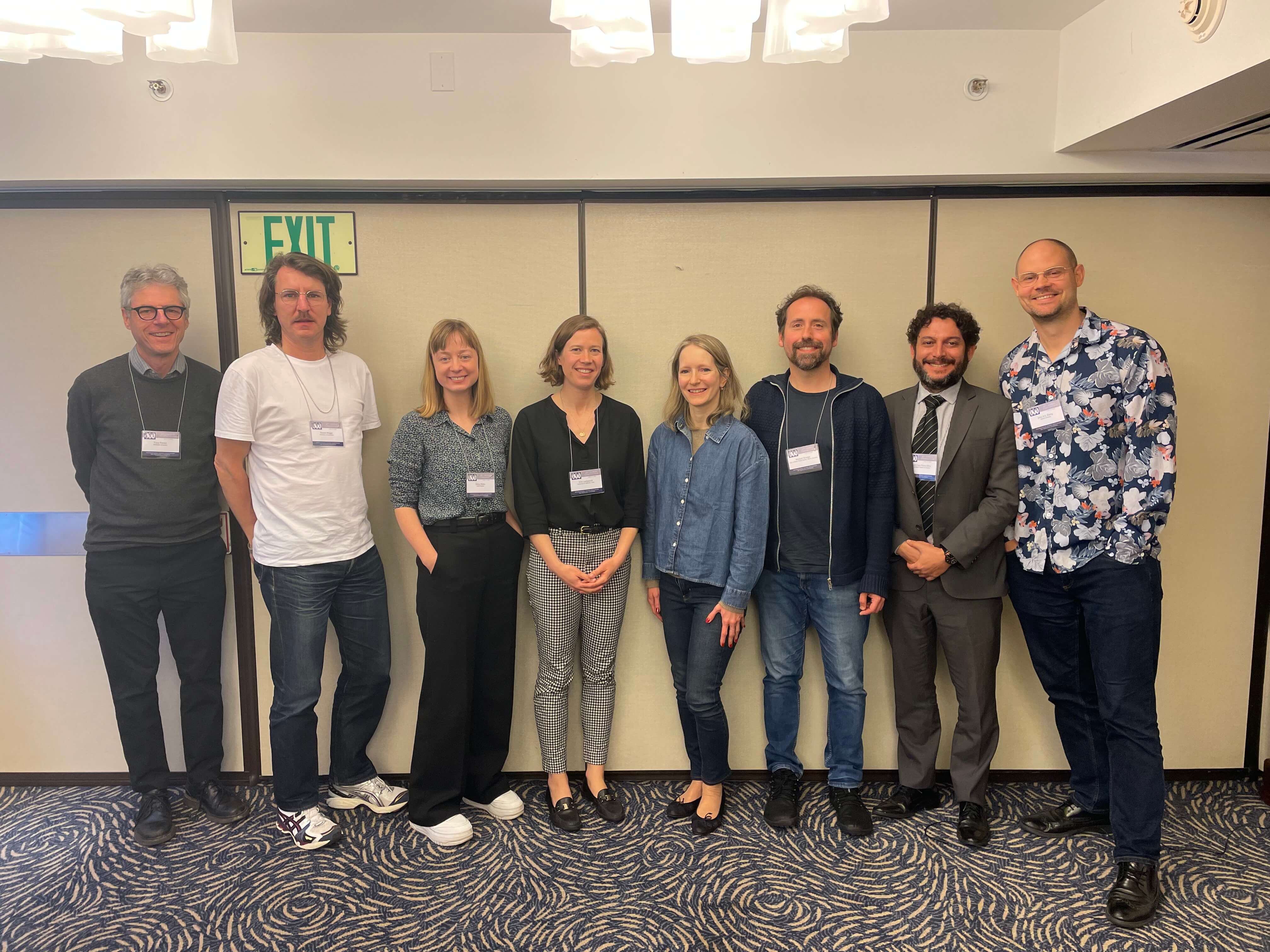Future Society and Democracy in Europe
We focus on the rapidly changing practices through which we live as societies– from automated decision-making that governs human life via algorithms, through new digitalisation that influence our socio-political organization and other new technologies that are increasingly influencing the way we consider what makes us human.

Whilst these shifts are often seen globally, though unequally, they are particularly pertinent to modern Europe, in particular the EU. On the one hand one of the EU’s aims is promotion of technological progress. Yet at the same time EU’s future has often been seen as dependent upon the maintenance of liberal values, in particular, human dignity, democracy, and the Rule of Law. The question then is, what the new technological developments mean for the future of the EU and its member states? On the other hand, the EU is not just a passive object of changes, but a powerful stakeholder, with a strong ambition to become a global leader in establishing regulations to counter some of the perceived negative effects of the above-described development.
Quote from Michael Strange: Our interesting times require new ways of doing research that can help us better understand the future and work collaboratively to support democratic visions for Europe.
- We envisage the proposed research contributing to multiple academic and societal debates including, but not limited to:
- Impact of digitalisation on political-societal-cultural space
- Role of new governing technologies (e.g., post-NPM) in altering how humans interact with one another in the production of society and conduct of democratic practices.
- The politics and societal dimensions of future forms of welfare, including healthcare in which AI is increasingly seen as more empathetic and authoritative than human doctors.
- The ways in which AI - as implemented in concrete applications as well as an imaginary - implies certain ideas about the shape of information, its truthfulness and how to retrieve it.
- Generative AI in the production of new forms of disinformation, propaganda, and deep fakes.
- The uptake of AI in diverse social and cultural contexts.
- Application of democratic theory to critical rethinking of the development and implementation of AI, including the role of digitalisation as both a form for individualisation and solidarity.
- The relationship between democratic policy processes and the EU’s regulatory role in digital technology, including the GDPR, the Digital Services Act, and the proposed AI Act.
- Michael Strange, Associate Professor, Department of Global Political Studies, Faculty of Culture & Society, Malmö University (Director)
- Tina Askanius, Associate Professor, School of Arts & Communication, Faculty of Culture & Society, Malmö University (Co-Director)
The Future Society and Democracy in Europe research group has hosted and participated in a number of events, meetings and workshops during the fall and spring, since its founding. Here is an overview:
Fall term 2023
26 October – Future Society & Democracy workshop at Malmö University. Introductory meeting sharing research knowledge amongst the group and developing collaboration.
2 November – AI Ethics. Co-organised within the AI Politics Hub at the Dept. of Global Political Studies, Malmö University. At present a whole industry of AI ethics consultancies is emerging, both in response to and influencing regulatory developments globally. For example, CredoAI has produced very many resources to supplement its paid services for firms and government agencies (https://www.credo.ai/resources?formats=eBook). Such materials illustrate both this industry and, more specifically, the process of turning broad ethics concepts into commercial and applicable products.
Presentations were given by Sally Bagheri and Michael Strange.
15 November – Evidence given by Dr Michael Strange to Roundtable on Responsible innovation and the education of future AI practitioners. On behalf of the United Nations Office for Disarmament Affairs (UNODA) and the Stockholm International Peace Research Institute (SIPRI), the roundtable explored how responsible innovation can be further promoted in the education of future AI practitioners. It examined how STEM students destined for a career in AI can gain awareness of the societal impact of technology by receiving formal training on responsible innovation as part of their university education. An exclusive group of professors and curriculum developers was invited to discuss existing good practices and look at how they can be disseminated, as well as identify the needs of future AI practitioners. Questions to be addressed included a) what the students should learn and how, b) whether AI curricula could be more multidisciplinary, and c) what practical obstacles would need to be overcome in the process.
28 November – Digital Afterlives. Public outreach talk at Spyken Gymnasium, Lund. Talk by Michael Strange to gymnasium (college/sixth form) students exploring ethics and the understanding of human sentience in an age of AI.
7 December – Non-Western approaches to AI. Co-organised within the AI Politics Hub at the Dept. of Global Political Studies, Malmö University. The presenters provided three perspectives by which to consider the politics of AI and automation from a non-Eurocentric perspective. The session was led by Dennis Munetsi, Mateo Villamil Valencia, and Ali Giama.
Spring term 2024
8 February – Visit to Louisiana exhibition ‘The Irreplaceable Human’. Research trip to the major exhibition ‘The Irreplaceable Human’, exploring concepts of human creativity and how we see both work and time, and using that to contextualise new societal developments in automation and artificial intelligence. The group were given a guided tour and afterwards compared notes. Several of those present are familiar with several of the installations and works on display, and plan to co-produce a critical intervention in response. The event included research group members from all three CEMES universities.
7 March – Workshop with Lund Kommune on ethical and political considerations in automation of social care. The event addressed some of the challenges and solutions for developing participatory processes, and included an ethics consultancy firm.
3 April – Artificial Intelligence as an issue for Global Political Economy – actors, structures, constraints, and possibilities’. Workshop at the International Studies Association annual conference, San Francisco. AI is typically presented as a technology-driven phenomenon in which humans are either the victims or beneficiaries. Yet, that narrative overlooks the complex transnational human relations structuring how that technology is produced, including whose data is being used and how, as well as the ownership and control of algorithmic systems used in large language and visual models, as well as automated decision-making.

15 April – Workshop on public trust and technology in Europe at Sankt Gertrud. Here we will explore changing levels of trust and perceptions towards automation and artificial intelligence, including disinformation, that are explored within the research in the group. We will also prepare for a major survey of public attitudes on the topic.
Researchers
University of Copenhagen
| Name | Title | Phone | |
|---|---|---|---|
| Andersen, Jack | Associate Professor | +4531705689 | |
| Bisgaard, Ditlev Adam Pihl | PhD Fellow | +4535330746 | |
| Hendricks, Vincent F | Professor | +4535329398 | |
| Lioma, Christina | Professor | ||
| Neumayer, Christina | Associate Professor | +4535333467 | |
| Søe, Sille Obelitz | Associate Professor | +4535321409 |
Lund University
| Andersson, Rickard | Associate Senior Lecturer, Dept of Strategic Communication |
| Andersson, Rickard | Researcher, Centre for Theology and Religious Studies |
| Bäck, Hanna | Professor, Dept of Political Science |
| Drazkiewicz, Elzbieta | Department of Arts and Theology |
| Fridlund, Patrik | Senior Lecturer, Centre for Theology and Religious Studies |
| Goldman, Aaron | Researcher, Studies in Faith and World Views |
| Mirsalehi, Talieh | Doctoral student in ethnology at the Department of Arts and Cultural Sciences |
| Miegel, Fredrik | Senior Lecturer, Department of Communication and Media |
| Mirsalehi, Talieh | Doctoral student in ethnology at the Department of Arts and Cultural Sciences |
| Persson, Amanda | PhD, Department of Arts and Cultural Sciences |
| Petersen, Marsanna | Doctoral student in ethnology at the Department of Arts and Cultural Sciences |
| Sundin, Olof | Department of Arts and Theology |
| Søilen, Karen | Associate Senior Lecturer, Department of Arts and Cultural Sciences |
| Uhl, Angelina |
Doctoral student, Department of Arts and Cultural Sciences
|
| White, James | Postdoctoral fellow, Dept of Technology & Society |
| Willim, Robert | Associate Professor, Department of Arts and Cultural Sciences |
Malmö University
| Ajjoub, Orwa | PhD, Department of Global Political Studies, Faculty of Culture & Society |
| Askanius, Tina | Associate Professor, School of Arts & Communication, Faculty of Culture & Society |
| Farrell-Molloy, Joshua | PhD, Department of Global Political Studies, Faculty of Culture & Society |
|
Lecturer, School of Arts and Communication, Faculty of Culture and Society
|
|
| Hansson, Kristofer | Department of Social Work, Faculty of Health & Society |
| Haynie-Lavelle, Jess | PhD, Department of Global Political Studies, Faculty of Culture & Society |
| McIver, Scott | Assistant Professor, Department of Global Political Studies, Faculty of Culture & Society |
| Munetsi, Dennis | PhD, Department of Global Political Studies, Faculty of Culture & Society |
| Norén, Fredrik Mohammadi | Associate Senior Lecturer, School of Arts & Communication, Faculty of Culture & Society |
| Strange, Michael | Associate Professor, Department of Global Political Studies, Faculty of Culture & Society |
| Witmer, Hope | Associate Professor, Department of Urban Studies, Faculty of Culture & Society |
| Åberg, John | Assistant Professor, Department of Global Political Studies, Faculty of Culture & Society |
Past events
-
24 Oct. - 26 Oct. 2024
Action Research for Citizen Health, Education & Social Sustainability
-
3 Oct. - 4 Oct. 2024
Health for Democracy, Democracy for Health
-
18 June 2024, 15:00-17:00
Surveillance Behind the Lenses: Raising Awareness of Eye-Tracking Privacy Risks in VR through Visceral Notice
-
18 June 2024, 10:00-12:00
Beyond the Ivory Tower
-
23 May - 24 May 2024
CONNOR
-
16 May 2024, 10:45-12:00
"Everyday Extremism" and the Mainstreaming of Conspiracy Narratives: Insights from Sweden
